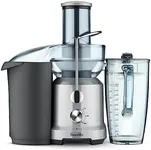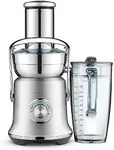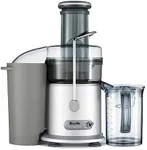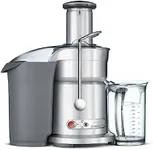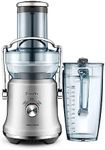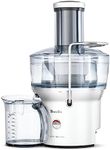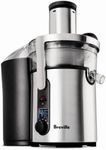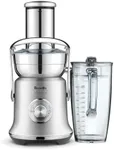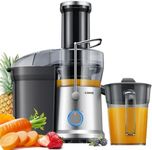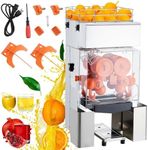Buying Guide for the Best Breville Juicer Machines
Choosing the right juicer machine can make a significant difference in your juicing experience. Breville offers a range of juicers, each designed to meet different needs and preferences. To find the best fit for you, it's important to understand the key specifications and how they align with your juicing habits and goals. Here are the main specs to consider when selecting a Breville juicer machine.Type of JuicerBreville offers different types of juicers, primarily centrifugal and masticating (cold press) juicers. Centrifugal juicers are faster and more convenient, making them ideal for those who need quick results and are juicing mostly fruits and vegetables with high water content. Masticating juicers, on the other hand, operate at a slower speed and are better at preserving nutrients, making them suitable for those who prioritize juice quality and plan to juice leafy greens and wheatgrass. Choose a centrifugal juicer if you value speed and convenience, and a masticating juicer if you prioritize nutrient retention and versatility.
Motor PowerThe motor power of a juicer is measured in watts and determines how efficiently the machine can extract juice. Higher wattage means more power, which is beneficial for juicing tougher produce like carrots and beets. Breville juicers typically range from 700 to 1200 watts. If you plan to juice a variety of hard and soft produce, a higher wattage (around 1000-1200 watts) would be ideal. For those who mainly juice softer fruits and vegetables, a lower wattage (700-900 watts) should suffice.
Feed Chute SizeThe size of the feed chute affects how much prep work is required before juicing. A larger feed chute allows you to insert whole fruits and vegetables without chopping them into smaller pieces, saving time and effort. Breville juicers often feature wide feed chutes, ranging from 3 to 3.5 inches. If you prefer minimal prep work, look for a juicer with a larger feed chute. However, if you don't mind spending a bit more time on preparation, a smaller feed chute can still be effective.
Juice Jug CapacityThe juice jug capacity indicates how much juice the machine can hold before you need to empty it. This is particularly important if you plan to make large batches of juice at once. Breville juicers typically come with jugs that hold between 1 to 2 liters. If you juice frequently or for multiple people, a larger capacity jug (around 1.5 to 2 liters) would be more convenient. For occasional or single servings, a smaller jug (1 liter) should be adequate.
Pulp Container SizeThe pulp container size determines how much pulp the juicer can collect before it needs to be emptied. A larger pulp container means less frequent interruptions during juicing. Breville juicers usually have pulp containers ranging from 2 to 3.5 liters. If you plan to juice large quantities or prefer continuous juicing without stopping to empty the pulp, opt for a juicer with a larger pulp container. For smaller, occasional juicing sessions, a smaller container will be sufficient.
Ease of CleaningCleaning a juicer can be a time-consuming task, so it's important to consider how easy it is to clean the machine. Breville juicers are designed with ease of cleaning in mind, often featuring dishwasher-safe parts and tools to help with cleaning. Look for models with fewer parts and those that are easy to disassemble and reassemble. If you value convenience and want to minimize cleaning time, choose a juicer with user-friendly cleaning features.
Noise LevelThe noise level of a juicer can be a significant factor, especially if you plan to use it early in the morning or in a shared living space. Centrifugal juicers tend to be noisier due to their high-speed operation, while masticating juicers are generally quieter. If noise is a concern for you, consider opting for a masticating juicer. However, if you can tolerate some noise for the sake of speed, a centrifugal juicer might be more suitable.
